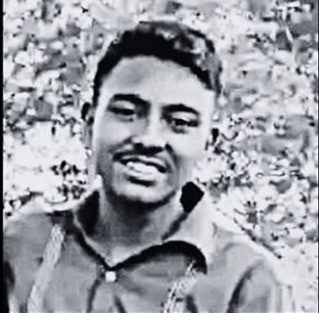More than a year before July of 2024, Jisan Ahmed, 19, married the love of his life Mishti Akter. A small-time vendor, he supplied water to shops in his neighbourhood from his battery-run cycle-van.
When life should have been wrapped in rose-coloured lenses, tragedy struck the couple’s life and newly-wed bliss during the Anti-discrimination Student Movement.
On July 20 of last year, despite the turbulent atmosphere on the protests on the streets, Jisan insisted on going to work to earn his daily income, ignoring the pleas of his mother. He got caught up in a clash between student protesters and law enforcers in Shonir Akhra’s Rayerbagh, and took shelter in a nearby shop.
It was just when he peeked outside to check if the violence had stopped that he was fatally shot. The bullet pierced through his eyebrow, which exited through his skull. He died on the spot.
The tragic tale would not end there unfortunately.
Unable to bear the pain of losing her husband, Mishti had stopped eating from the very day he was shot dead. Over a week later, she committed suicide.
Jisan’s father, Babul Sarder, who worked in South Sudan for nearly a decade and was there at the time, rushed back to the country after hearing of his son’s murder.
He travelled to Rangpur for Mishti’s burial in her family cemetary. He said, “She couldn’t bear the thought of living without him. She went into shock after my son was killed and was starving herself. She clutched onto his clothes and cried continuously.”
Though Babul had always hoped his son would join him abroad for a better future, Jisan was adamant not to leave Mishti behind. Babul ultimately accepted his son’s decision.
Jisan is remembered as a hardworking young man who made around Tk 700 a day by supplying drinking water.
“My son often wanted to buy a bike but I didn’t allow it fearing what if something happened to him … there would be no one to carry my coffin after I died, as he is my only son. I never imagined that I would be the one carrying my son’s coffin instead.”
He tearfully commented on the brutality of the situation and Jisan’s death, “In Sudan, even the poorest people have AK-47s, but they don’t kill innocent people like birds. But my son was killed like one.”
“Nobody from the government or police even came to offer their condolences or apologise for such a tragedy in our lives but I saw our prime minister shedding tears over the metro rail, which was built with remittance from people like us,” referring the events that transpired last year.
The former Prime Minister Sheikh Hasina shocked Bangladeshis last year in July, when she made a public appearance mourning the vandalism carried out on the capital’s metro stations and carriages, instead of ensuring stability in the country.
“The metro rail stations can be repaired but can she give back my son and daughter-in-law?” Babul cried.
“I have left justice up to the Almighty,” he added, his voice choked with the grief he must bear for the rest of his life.


